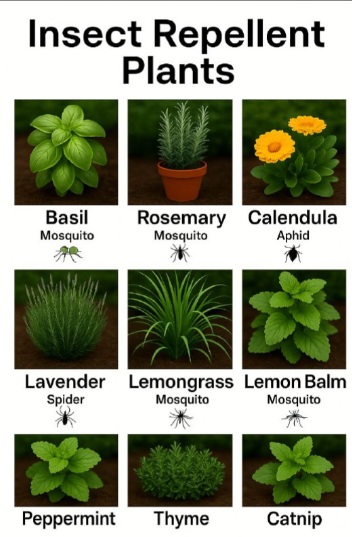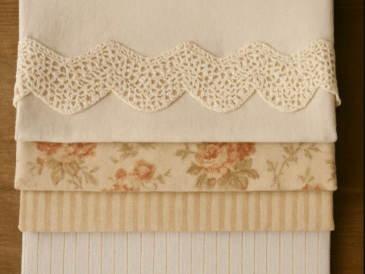PART 1: Discover the Power of Mosquito-Repellent Plants
Mosquitoes are more than just a summer nuisance. They are known carriers of dangerous diseases such as Zika virus, West Nile virus, malaria, dengue fever, and chikungunya. With the increasing concern over health risks, homeowners are seeking safer and more effective alternatives to chemical repellents. Fortunately, there is a natural, sustainable solution: incorporating mosquito-repellent plants into your garden.
These plants not only help create a more enjoyable outdoor space but also enhance your garden’s beauty, fragrance, and biodiversity. If you are looking for a safe, eco-friendly way to deter mosquitoes while enriching your home environment, these natural mosquito-repellent plants are the perfect solution.
In this detailed guide, you will discover the top 10 plants scientifically known to repel mosquitoes and how you can use them to transform your garden into a mosquito-free sanctuary.
Why Natural Mosquito Repellents Are the Future
Choosing natural mosquito repellents over synthetic chemicals is a decision that benefits not only your family and pets but also the environment. Here are key reasons why more people are opting for plants that repel mosquitoes naturally:
- Chemical-free Protection: Reduces exposure to harmful toxins.
- Cost-effective: Once established, these plants require minimal investment compared to seasonal chemical sprays.
- Multi-purpose Benefits: Many plants offer culinary uses, aromatic benefits, and aesthetic value.
- Increased Biodiversity: Natural gardens attract beneficial insects such as bees and butterflies.
With the right selection and care, your garden can serve as a natural defense against mosquitoes while becoming a lush, welcoming oasis.
Let us explore the best mosquito-repelling plants to add to your outdoor spaces.
The 10 Best Mosquito-Repellent Plants for Your Garden
Citronella Grass (Cymbopogon nardus)
Citronella grass is the most recognized natural mosquito repellent. Its potent citrusy aroma masks the scents that attract mosquitoes. Although citronella oil is commonly extracted for candles and sprays, having the actual plant in your garden provides a stronger, more consistent natural barrier. Citronella thrives in large pots or directly in sunny garden beds.
Lavender (Lavandula angustifolia)
Lavender is renowned for its calming scent and vibrant purple flowers. Beyond its aesthetic appeal, lavender’s essential oils disrupt a mosquito’s ability to smell, thereby keeping them at bay. Plant lavender along walkways, near seating areas, or in containers placed on patios to maximize its mosquito-repelling effects.
Marigolds (Tagetes spp.)
Marigolds are vibrant, hardy flowers containing pyrethrum, a natural insecticide used in many commercial repellents. Their scent deters mosquitoes, aphids, and even rabbits. Plant marigolds around vegetable gardens, entryways, and outdoor living spaces to create an attractive yet functional barrier.
Basil (Ocimum basilicum)
Basil is not only an essential kitchen herb but also a powerful mosquito deterrent. Varieties such as lemon basil and cinnamon basil emit strong fragrances that mosquitoes find highly offensive. Basil plants prefer sunny locations and well-drained soil, making them perfect for patios, windowsills, or garden beds.
Catnip (Nepeta cataria)
Catnip contains nepetalactone, a compound found to be highly effective against mosquitoes, even more so than DEET, the active ingredient in most chemical repellents. Catnip is easy to grow, tolerates various soil types, and doubles as entertainment for household cats.
Peppermint (Mentha × piperita)
The sharp, refreshing aroma of peppermint makes it a natural insect deterrent. Plant peppermint in pots to prevent its invasive spread, and place them around patios and doorways to keep mosquitoes and other pests at a distance. Additionally, crushed peppermint leaves can be rubbed onto the skin for immediate relief from bites.
Lemon Balm (Melissa officinalis)
Lemon balm is another member of the mint family, known for its strong lemon scent that mosquitoes dislike. It is rich in citronellal, the active ingredient in citronella oil. Grow lemon balm in containers or controlled garden spaces to prevent it from overtaking other plants.
Rosemary (Rosmarinus officinalis)
This versatile herb thrives in hot, dry conditions and repels mosquitoes with its woody scent. Rosemary is ideal for use near outdoor kitchens or grilling areas, where its leaves can also serve culinary purposes. Burning rosemary sprigs can produce a mosquito-repelling smoke that enhances outdoor gatherings.
Garlic (Allium sativum)
While garlic does not repel mosquitoes instantly, planting it around your garden gradually reduces mosquito populations. Its strong sulfurous scent acts as a slow-release deterrent. Incorporate garlic among vegetable beds or flower borders for an added layer of protection.
Geraniums (Pelargonium citrosum)
Lemon-scented geraniums are beautiful flowering plants with a fragrance similar to citronella. These plants are especially effective when placed in pots around patios, balconies, and windows. Their stunning blooms provide aesthetic appeal while offering natural mosquito defense.
Creating a Stronger Defense
While these plants can significantly reduce mosquito activity, they are most effective when integrated with additional preventive measures such as:
- Removing standing water
- Installing fine mesh screens
- Using outdoor fans to disrupt mosquito flight patterns
- Employing natural essential oil sprays for personal protection
By combining strategic planting with smart environmental management, you can enjoy outdoor spaces with minimal mosquito interference.
Prepare to take your mosquito-free garden to the next level. In the second part, you will discover advanced strategies to design your garden layout for maximum protection, boost plant effectiveness, and learn expert secrets to maintain a mosquito-free haven all season long.
Continue reading to unlock the ultimate secrets for a mosquito-free life naturally.
PART 2: Advanced Strategies to Maximize Your Mosquito-Repellent Garden
Designing Your Garden for Maximum Protection
Strategic garden design can greatly enhance the mosquito-repelling properties of your plants. Follow these expert tips:
Create Protective Plant Barriers
Plant mosquito-repellent species along the borders of your yard, patio, or deck. A dense wall of citronella, lavender, and marigolds acts as a living shield that deters mosquitoes before they reach seating or play areas.
Companion Planting for Enhanced Repellence
Integrate mosquito-repellent plants with your vegetables and flowers. For example, placing basil near tomatoes protects them from pests while repelling mosquitoes. Companion planting maximizes space and functionality.
Use Potted Plants Strategically
Potted plants allow you to concentrate mosquito-repelling power in high-traffic areas. Place pots filled with peppermint, rosemary, and lemon balm near doorways, outdoor dining spaces, and windows.
Layer Scent Intensities
Group strong-scented plants together for amplified effectiveness. Combining lavender, rosemary, and citronella in the same area can overwhelm mosquitoes’ sensory detection abilities.
Maintenance Tips to Sustain Effectiveness
- Water Correctly: Most mosquito-repellent plants prefer well-drained soil. Overwatering creates standing water, which attracts mosquitoes.
- Prune Regularly: Keep plants healthy and aromatic by pruning dead flowers and leaves.
- Harvest Herbs Frequently: Use your basil, rosemary, and mint often. Harvesting promotes new growth and maintains strong essential oil production.
- Inspect for Standing Water: Regularly check pots, saucers, and garden areas for water accumulation.
- Refresh Mulch Layers: Mulch helps retain soil moisture while reducing areas where mosquitoes might breed.
Additional Natural Mosquito Repellents
Beyond planting, you can reinforce your mosquito control efforts with these natural solutions:
- Essential Oil Sprays: Mix citronella, lavender, or peppermint oil with water and witch hazel for an effective homemade spray.
- Mosquito Nets and Screens: Cover outdoor spaces like patios or pergolas with fine mesh to block mosquito entry.
- DIY Mosquito Traps: Simple traps using sugar water and yeast can lure and capture mosquitoes.
Frequently Asked Questions (FAQ)
Can a garden completely eliminate mosquitoes?
While mosquito-repellent plants can significantly reduce mosquito activity, complete elimination usually requires a combination of strategies, including removing breeding grounds and applying natural deterrents.
How soon will I notice a difference after planting?
Results can vary, but many gardeners report reduced mosquito presence within a few weeks of establishing dense, aromatic plantings.
Which plant is the most effective?
Citronella grass is widely regarded as the most effective mosquito-repelling plant, particularly when grown in combination with other strong-scented species like lavender and lemon balm.
Conclusion: Build Your Mosquito-Free Oasis Today
By integrating these powerful mosquito-repellent plants into your garden, designing strategic layouts, and maintaining your outdoor space with simple, effective practices, you can create a safe, relaxing environment free from the threat of mosquito-borne diseases.
Say goodbye to chemical sprays and enjoy the natural beauty and benefits that only a thoughtfully planted garden can offer.
Start today and experience the peace of mind that comes from a truly mosquito-free outdoor lifestyle.




